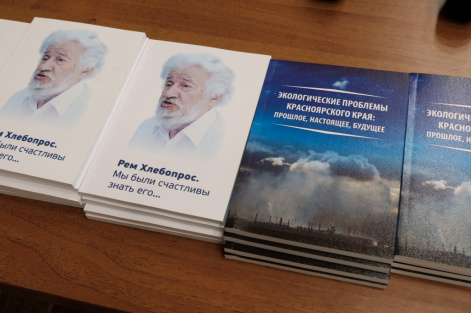Krasnoyarsk Science Center SB RAS discussed complex systems in extreme conditions
7 October 2021 г. FRC KSC SB RAS

Following the interdisciplinary approach laid down by the ideological inspirer of the symposium, Professor Rem Grigorievich Khlebopros, the Symposium discussed topical problems of data analysis for environmental monitoring (Doctor of Technical Sciences K.V.Simonov, Krasnoyarsk), population interactions (Doctor of Biological Sciences, Prof. V.G.Sukhovolsky, Krasnoyarsk; Corresponding Member of the Russian Academy of Sciences, Doctor of Biological Sciences, Prof. E.Ya. Frisman, Birobidzhan), peculiarities of using physical and chemical methods in biological systems (Candidate of Chemical Sciences, F.N. Tomilin, Krasnoyarsk), medical aspects of immunity (Doctor of Medical Sciences, professor A.A. Savchenko, Krasnoyarsk).
Andrey Anatolyevich Savchenko, Doctor of Medical Sciences, Professor of the Scientific Research Institute of Medical Problems of the North, KSC SB RAS, told about his report and participation in the Symposium:
“First of all, we are engaged in fulfilling a fundamental task, we study regularities in the immunity. We are now planning to deeper investigate its relationship with metabolism. The second challenge is the practical application of our research. We took the first steps in this direction in 2013, when we received the first grant from the Krasnoyarsk Science Foundation. As part of this grant, we developed a technology for the production of dendritic cells in vitro. This allowed us to move on to studying the biology of dendritic cells and their relationship with other cells of the immune system.
All these studies were carried out jointly with the A.I. Kryzhanovsky Krasnoyarsk Regional Clinical Center of Oncology with the participation of colleagues from the Krasnoyarsk State Medical University. Some practical and theoretical aspects were implemented in cooperation with the St. Petersburg Institute of Experimental Medicine.
In Russia, three cities were able to implement this technology. These are Novosibirsk, St. Petersburg, in particular the N.N. Petrova National Medical Research Center of Oncology and the Russian Cancer Research Center in Moscow. We cooperate with these centers, organize conferences, and exchange the obtained data.
From the Symposium, concerning my topic, I would like to get a response from mathematicians. We are interested in obtaining some mathematical laws which would allow identifying new mechanisms for the immunity control. Interdisciplinary interaction is highly valuable at such events. "
Konstantin Vasilievich Simonov, Doctor of Technical Sciences, Leading Researcher at the Institute of Computational Modeling of KSC SB RAS told how strong earthquakes are now being monitored.
“Humanity is moving away from short-term predictions of the parameters of expected earthquakes into long-term assessments: calculations of risk, damage and zoning according to the degree of danger. This task is solved with high accuracy. The buildings are constructed taking into account seismic hazard assessments and seismic zoning maps.
In the Yenisei region, including the seismically active zones of Tyva and the south of the Krasnoyarsk Region, a geomonitoring system has been operating for more than 20 years. Scientists carry out detailed studies based on geomonitoring of seismically active zones, and they issue quarterly reports on orders from the Ministry of Emergency Situations, the Ministry of Natural Resources of the Krasnoyarsk Region and Russian Federation.
The point in our work is that by studying foreshocks of an expected seismic event, we have an opportunity to apply maps of variations of gravity anomalies according to observations of the space system GRACE (Gravity Recovery and Climate Experiment) to solve the problem of estimating the characteristics of a probable strong earthquake”.
An active discussion resulted from reports on the pathogenetic features of Internet addiction in an ethnically heterogeneous population and patterns of changes in the population composition of cells of the innate and adaptive components of the immune system, indicating the presence of a relationship between the course, outcome of the disease and type of immune response.
A number of reports presented by the scientists of FRC KSC SB RAS were devoted to the development of new biological preparations based on nanoparticles and their application in biology and medicine.
Moreover, within the framework of the Symposium, with the support of SETAC (Society of Environmental Toxicology and Chemistry), the satellite International Conference "Environmental Monitoring: Methods and Approaches" was successfully held. Scientists presented modern environmental testing methods with an emphasis on biological tests at various levels of organization. As a result of the Conference, agreements on joint research were reached.
Summing up the results of the Symposium "Complex systems in extreme conditions", one can conclude that the problems associated with the study of complex systems are faced with in various fields of science. Note that the answer to the questions formed, which was obtained for one type of complex systems, is often used to analyze complex systems of another type, which was discussed in the reports of the symposium participants.
As a result of the Round Table, it was decided to continue holding the Symposium, preserving the interdisciplinary approach to the analysis of complex systems in ecology, biology, and medicine.
________________
In total, 64 people attended the main part of the symposium as listeners and participants, and 68 people took part in the satellite conference "Environmental Monitoring: Methods and Approaches".
Geography of the Symposium:
Kyzyl, Saratov, Arkhangelsk, Birobidzhan, Pushchino (Moscow region), Surgut, Tyumen, Kirov, Syktyvkar, Novosibirsk, Sevastopol, Krasnoyarsk
Foreign participants: India, Egypt, Armenia, USA
Follow the link to download the Proceedings of the International Satellite Conference "Environmental Monitoring: Methods and Approaches" and the XX International Symposium "Complex Systems in Extreme Conditions":
https://ksc.krasn.ru/upload/medialibrary/3cc/3ccd7a383c4642e4b990c992e9fa7625.pdf
Share:
